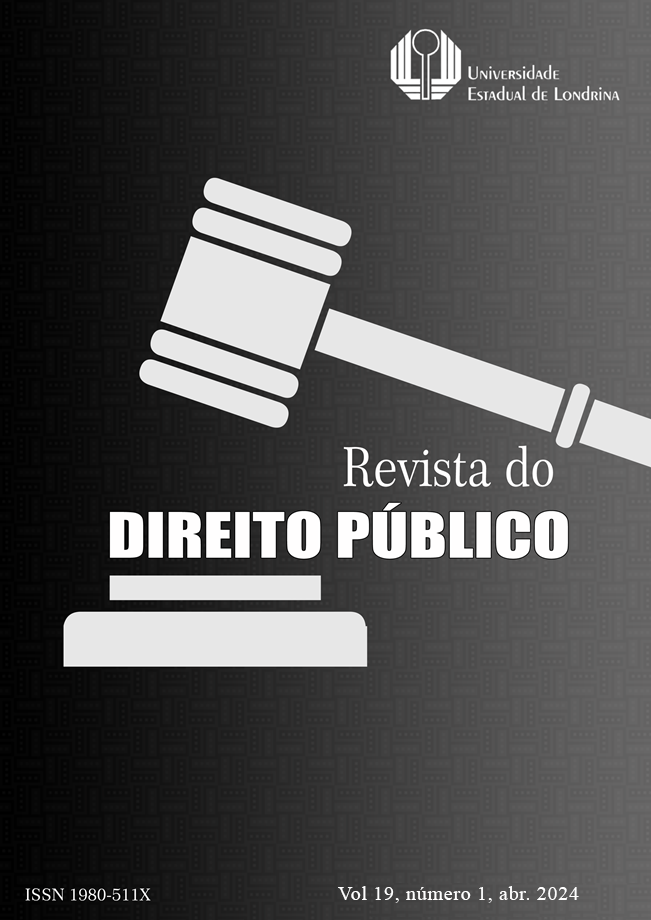DIATOPIC CONSTITUTIONALISM:
OPENING TO GLOBAL CONSTITUTIONALISM
DOI:
https://doi.org/10.5433/1980-511X.2024.v19.n1.47470Palavras-chave:
comparação, constitucionalismo, diatópico, globalResumo
The text aims at identifying the opening of a global
constitutionalism education from evaluating fundaments of
constitutional norms. At first, it was sought to establish a measure
of formal similarity between the constitutional texts (rules and
principles) of several states. Through expressions contained
in constitutional texts it was possible to identify the formal
elements which determine several constitutions. The selection
of these expressions was carried out randomly, and its majority
was broad. It has been demonstrated that there is, at least in
textual context, a similarity of half of normative constitutional
commands. The method used was analytical because it analyzed
constitutional texts based on bibliographies.
Downloads
Referências
Cambridge Dictionary. Online. https://dictionary.cambridge.org. Acess: 06/12/2021.
CRAWFORD, James and KOSKENNIEMI, Martti. International Law. Cambridge: Cambridge University Press, 2013.
EUROPEAN Court of Human Rights. European Convention on Human Rights. https://www.echr.coe.int/documents/convention_eng.pdf. Acess 09/01/2023.
FABBRINI, Frederico. The Margin of Appreciation and the Principle of Subsidiarity: A Comparison. In: iCourts Working Paper Series. n. 15, 2015. p. 1-17.
GUTAN, Manuel. Romanian tendential constitutionalism and the limits of European constitutional culture. In: Martin Belov (Ed.). Global constitutionalism and its challenges to westphalian constitutional law. Oxford: Hart, 2018. p. 103-129.
HÄBERLE, Peter. Der kooperative Verfassungsstaat - aus Kultur und als Kultur. Vorstudien zu einer universalen Verfassungslehre. Berlin: Duncker & Humblot, 2013. DOI: https://doi.org/10.3790/978-3-428-54032-7
HESSE, Konrad. Grundzüge des Verfassungsrechts der Budensrepublik Deutschland. 19 Aufl. Heidelberg: Müller, 1993.
KIIVER, Philipp. The national parliaments and the principle of subsidiarity. In: Maastricht Journal of European and Comparative Law. v. 15. 2008. p. 77-83. DOI: https://doi.org/10.1177/1023263X0701500108
KOTZUR, Markus. Der Jurist als Weltbürger - Überlegungen zu Bildungsidealen und Ausbildungszielen der Juristenausbildung in Zeiten der Globalisierung. In: Wolfgang Durner, Franz Reimer, Indra Spiecker genannt Döhmann und Astrid Wallrabenstein (Hrsg.). Das sinnvoll Denkbare denken, das davon Machbare machen. Gedächtnisschrift für Arndt Schmehl. Berlin: Dunker & Humblot, 2019. p. 29-40.
KOTZUR, Markus. Europe's unfinished community of law. Legal challenges of the integration project. In: Adreas Grimmel (Ed.). The crisis of the European Union. Challenges, Analyses, Solutions. Routledge, s.d. p. 26-40. DOI: https://doi.org/10.4324/9781315443683-3
KOTZUR, Markus. „Verstehen durch Hinzudenken" und/oder „Ausweitung der Kampfzone"? In: Jahrbuch des Öffentlichen Rechts der Gegenwart. Band. 63. Tübingen: Mohr Siebeck, 2015. p. 355-365. DOI: https://doi.org/10.1628/joer-2015-0013
MANSSEN, Gerrit. Grundrechte. München: Beck, 2000.
SARLET, Ingo Wolfgang, MARINONI, Luiz Guilherme e MITIDIERO, Daniel. Curso de direito constitucional. 8 ed. São Paulo: Saraiva, 2019.
SCELLE, Georges. Précis de droit des gens. Principes et systématique. Paris: Dalloz, 1932.
UNITED NATIONS. Charter of the United Nations. https://www.un.org/en/sections/un-charter/chapter-i/index.html. Acess 19/04/2020.
WELLENS, Karel. Revisiting Solidarity as a (Re-)Emerging Constitutional Principle: Some Further Reflections. In: Rüdiger Wolfrum and Chie Kojima (eds.). Solidarity: A Structural Principle of International Law. Heidelberg:
Downloads
Publicado
Como Citar
Edição
Seção
Licença
Copyright (c) 2024 Guilherme Camargo Massaú

Este trabalho está licenciado sob uma licença Creative Commons Attribution-NonCommercial-NoDerivatives 4.0 International License.
Os autores cedem à Revista do Direito Público, direitos exclusivos de primeira publicação, com o trabalho simultaneamente licenciado sob a Licença Atribuição-NãoComercial-CompartilhaIgual 4.0 Internacional. Esta licença permite que terceiros façam download e compartilhem os trabalhos em qualquer meio ou formato, desde que atribuam o devido crédito de autoria, mas sem que possam alterá-los de nenhuma forma ou utilizá-los para fins comerciais. Se você remixar, transformar ou desenvolver o material, não poderá distribuir o material modificado.












